21 December 2010--More Misconduct Headlines 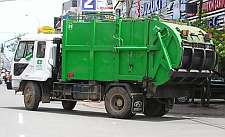
Click here to see still more headlines of official misconduct in Cambodia.
1 September 2010--Logistics Index
In 2010, Cambodia dropped almost 50 places from its ranking in the previous World Bank logistics index which measures a country's ability to move goods around and link up with international markets. Of 155 countries rated, Cambodia fell into the 129th place, beneath Bhutan and Liberia. The index surveys indicators such as the efficiency of customs, the quality of infrastructure, and the possibility of competively priced shipments. In explaining the results, the World Bank noted that other developing countries had made great strides while Cambodia hadn't, so that it slipped in its ranking. 
16 August 2010--Easy Money
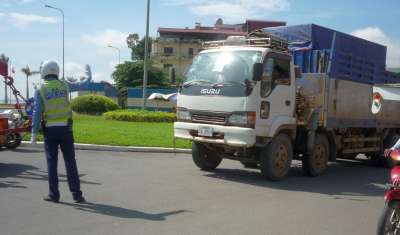 When I first arrived in Phnom Penh ten years ago, it was extremely rare to see a policeman in the street. They tended to hover on the street corners waiting for victims to be extorted. It was considered dangerous to be in the street doing your job. Heck, you could get hit by a car! Today there are actually some feeble, untrained attempts to direct traffic--occasionally. This is not likely one of them. Most probably this driver's offense was to be in a truck and all trucks get stopped for bribe money. The driver doesn't have to do anything wrong to be stopped; just be in a truck.
When I first arrived in Phnom Penh ten years ago, it was extremely rare to see a policeman in the street. They tended to hover on the street corners waiting for victims to be extorted. It was considered dangerous to be in the street doing your job. Heck, you could get hit by a car! Today there are actually some feeble, untrained attempts to direct traffic--occasionally. This is not likely one of them. Most probably this driver's offense was to be in a truck and all trucks get stopped for bribe money. The driver doesn't have to do anything wrong to be stopped; just be in a truck.
10 August 2010--Childhood Tuberculosis
 Outside of Africa, Cambodia has the highest incidence of tuberculosis in the world with 495 new cases each year for every 100,000 population. But even though TB is common in Cambodia, very little is known about the disease's effects on children. Because of this a new project is being launched in Svay Rieng Province to study the disease in 1,000 infants and children under five. The study hopes to collect data to aid research and treatment and will also improve the ability of health workers to screen for and diagnose TB in Cambodian children.
Outside of Africa, Cambodia has the highest incidence of tuberculosis in the world with 495 new cases each year for every 100,000 population. But even though TB is common in Cambodia, very little is known about the disease's effects on children. Because of this a new project is being launched in Svay Rieng Province to study the disease in 1,000 infants and children under five. The study hopes to collect data to aid research and treatment and will also improve the ability of health workers to screen for and diagnose TB in Cambodian children.
9 August 2010--Where to go?
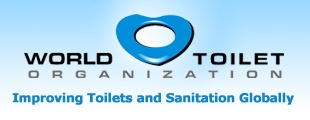 According to the recent census, only 34% of Cambodian households have toilets. Focusing only on the rural area, the percentage drops to 23%. The World Toilet Organization has an office near my house, and they certainly have their work cut out for them. 37% of households have at least one phone; 44% have at least one motorbike. But there is a lot less glitz and glamor about having a toilet. Recognizing that, the WTO's approach has been not to emphasize only the inherent health benefits of toilets. Instead the WTO has made having a toilet a status symbol while emphasizing easy installation, a water flush, and even a snazzy tile squat pan. Their efforts have been aided by the introduction of the $30 Easy Latrine, cheap enough and able to be installed the same day. Easy Latrine's makers also stress a safety factor, that women and girls no longer have to sneak out at night into the bush to use the toilet.
According to the recent census, only 34% of Cambodian households have toilets. Focusing only on the rural area, the percentage drops to 23%. The World Toilet Organization has an office near my house, and they certainly have their work cut out for them. 37% of households have at least one phone; 44% have at least one motorbike. But there is a lot less glitz and glamor about having a toilet. Recognizing that, the WTO's approach has been not to emphasize only the inherent health benefits of toilets. Instead the WTO has made having a toilet a status symbol while emphasizing easy installation, a water flush, and even a snazzy tile squat pan. Their efforts have been aided by the introduction of the $30 Easy Latrine, cheap enough and able to be installed the same day. Easy Latrine's makers also stress a safety factor, that women and girls no longer have to sneak out at night into the bush to use the toilet.
5 June 2010--Making a Joke of Justice Here is what happened:
The whole thing is totally bizarre, all these officials acting as if they are upholding the rule of law in a properly functioning legal system when they are just making a mockery of it! Imagine charging a lawyer for representing a client! And of course none of the convictions and rejections of the appeals were a surprise. In this country, the surprise would be if justice were actually handed down.
 On 2 June 2010, the Cambodian Supreme Court rejected the appeal of Ms. Mu Sochua against a conviction for defamation in a lower court last August. The whole sordid episode shows the lack of sophistication, class, and integrity of certain high-level government officials and the court system.
On 2 June 2010, the Cambodian Supreme Court rejected the appeal of Ms. Mu Sochua against a conviction for defamation in a lower court last August. The whole sordid episode shows the lack of sophistication, class, and integrity of certain high-level government officials and the court system.
3 June 2010--A Dirty Word in Cambodia
 Since November, 2009 hundreds of Cambodians, especially children have contracted cholera, a disease caused by contaminated food and water supplies. It produces very watery diarrhea that draws water from the blood stream. A Swiss doctor who has set up a series of free hospitals for children in Cambodia has taken out full-page ads in the newspapers warning of the disease and encouraging the government to alert people and take measures to prevent the spread of the disease which can easily be fatal in children. The government's response has been to do almost nothing except to speak occasionally of "acute watery diarrhea." It sounds bad to say a country has cholera so the government just refuses to use the word—and to adequately address the problem.
Since November, 2009 hundreds of Cambodians, especially children have contracted cholera, a disease caused by contaminated food and water supplies. It produces very watery diarrhea that draws water from the blood stream. A Swiss doctor who has set up a series of free hospitals for children in Cambodia has taken out full-page ads in the newspapers warning of the disease and encouraging the government to alert people and take measures to prevent the spread of the disease which can easily be fatal in children. The government's response has been to do almost nothing except to speak occasionally of "acute watery diarrhea." It sounds bad to say a country has cholera so the government just refuses to use the word—and to adequately address the problem.
12 February 2010--Option for the Rich

The Cambodia government really doesn't seem to get it. Besides the stealing of the land of poor people by military and government officials and other forms of abuse of the common people, the state-owned electricity company is now raising the rates charged the poor people for electricity. And it is lowering the rates for commercial and industrial groups, NGOs, embassies, and foreigners. Cambodia has one of the least effective and most highly priced electricity grids in the world, and now the poor will have to pay 56% more for the little electricity they could afford before while the groups that could afford to pay more get a reduction. In one sense, it's a smaller problem than one might think because only 17% of Cambodia has electricity!!
9 February 2010—Shameful Decline The annual report of Human Rights Watch for 2009 described a decline in the human rights situation in Cambodia. While noting a bright spot—the Khmer Rouge Tribunal's prosecution of one of the architects of the Cambodia genocide, the report pointed out more restrictions on free speech and freedom of assembly. Commenting on an increase in child rape, the report highlighted "a culture of impunity [that] has made the perpetrators unafraid...."
29 January 2010
This morning on the way to mass in Tuol Kork, I passed a large military truck loaded with lumber--not 2x4s and plywood!--backing into a high-ranking military officer's house. No one would allege that our officer got the lumber illegally or that he's making any money from it, but why is a military truck delivering wood--and to a private home? Maybe he's going to make a bookcase. Or a gun rack! That's it--a gun rack!
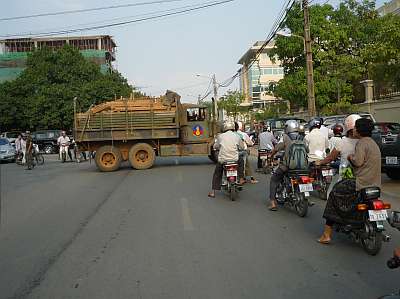
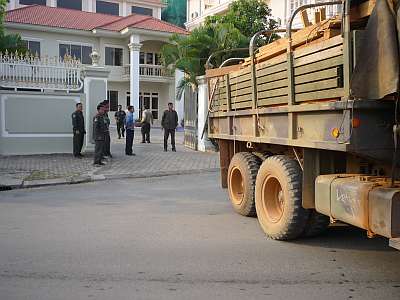
There are almost regular articles in the newspapers about military trucks, often in convoys, hauling illegally logged lumber from the forests of Cambodia. The stolen luxury woods earn a high price on the blackmarket or make a nice gift to Chinese officials for sweetening a deal or they could even be used in a local official's house.
12 January 2010 In addition to the nationalistic speeches and flags along the streets for celebrating "Liberation Day" or "Occupation Day" (see January 7, below), the CPP ruling party also had the Cambodia-Vietnam Monument near the river refurbished. It was spray cleaned and had a new graphic of joined Cambodian and Vietnamese flags added to the side near the top.
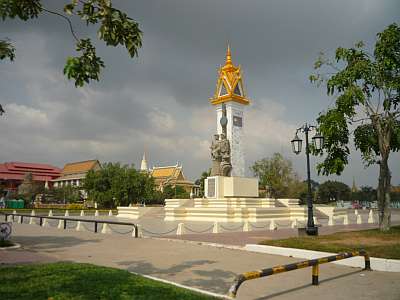
11 January 2010--More Misconduct Headlines 
Click here to see still more headlines of official misconduct in Cambodia.
7 January 2010—Liberation or Occupation? January 7th is one of the 24 public holidays in Cambodia. It marks the day the Vietnamese army came into Cambodia and attacked the Khmer Rouge. For the ruling CPP political party, which came in with the Vietnamese army, today is Liberation Day. But for many people, and especially the opposition, today is Occupation Day because the Vietnamese army stayed on and occupied Cambodia for many years. Many NGOs and organizations do not observe the holiday today but the CPP made a point of putting out even more flags than usual today, and two days ago the prime minister lambasted in his typical fashion all those had other thoughts and feelings about this day different from his.
